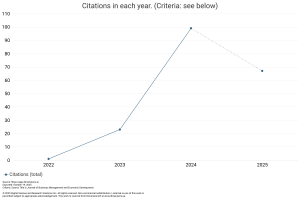Effect of Employee Competency on Employee Performance Moderated by Organizational Community
DOI:
https://doi.org/10.59653/jbmed.v3i02.1610Keywords:
Employee competence, Employee performance, Organizational commitment, Target Sales, Skills, Loyalty, RamayanaAbstract
The purpose of this study was to ascertain how employee competence at Ramayana Mall Serang affected employee performance, which was influenced by organizational commitment.
This study employs a descriptive methodology and a quantitative research design. Next, the study's population, which consists of 67 respondents, is the staff of Ramayana Mall Serang. Using non-probability sampling approaches, this study intends to examine and ascertain the impact of employee competence (X) on employee performance (Y), which is then regulated by organizational commitment (Z) at Ramayana Mall. Using the SmartPLS4.0 analysis tool, structural equation modeling, or SEM, is the data analysis method employed in this thesis study. According to the study's findings, (1) employee performance is positively and significantly impacted by employee competency. (2) Employee performance is positively and significantly impacted by organizational commitment. (3) The relationship between employee competency and performance is not moderated by organizational commitment in a positive and meaningful way.
Downloads
References
Aisyah, et al. (2021). “Pengaruh Pengalaman Dan Kompetensi Terhadap Produktivitas Kerja. Journal Of Accounting And Business Management (Rjabm).
Aljuwaiber, A. (2021). Enabling Knowledge Management Initiatives through Organizational Communities of Practice. South Asian Journal of Business and Management Cases, 10(3). https://doi.org/10.1177/22779779211036961
Asraf, et all. (2023). Effect of Work Environment, Motivation and Job Satisfaction on Employee Performance at PT. Dua Tiga Sejahtera. Journal of Business Management and Economic Development, 1(03), 420–463. https://doi.org/https://doi.org/10.59653/jbmed.v1i03.189
Blanka, C., Krumay, B., & Rueckel, D. (2022). The interplay of digital transformation and employee competency: A design science approach. Technological Forecasting and Social Change, 178. https://doi.org/10.1016/j.techfore.2022.121575
Bootz, J. P., Borzillo, S., & Raub, S. (2023). Leaders of organisational communities of practice: their characteristics, activities, and fit with their communities. Knowledge Management Research and Practice, 21(5). https://doi.org/10.1080/14778238.2022.2120837
Chen, M., Babar, M., Ahmed, A., & Irfan, M. (2023). Analyzing the Impact of Enterprise Social Media on Employees’ Competency through the Mediating Role of Knowledge Sharing. Sustainability (Switzerland), 15(12). https://doi.org/10.3390/su15129499
Chen, Y., Ning, R., Yang, T., Feng, S., & Yang, C. (2018). Is transformational leadership always good for employee task performance? Examining curvilinear and moderated relationships. Frontiers of Business Research in China, 12(1). https://doi.org/10.1186/s11782-018-0044-8
Chen, Y. P., & Shaffer, M. A. (2017). The influences of perceived organizational support and motivation on self-initiated expatriates’ organizational and community embeddedness. Journal of World Business, 52(2). https://doi.org/10.1016/j.jwb.2016.12.001
Effendi, F., Tjahjono, H. K., & Widowati, R. (2024). Trend research of employee competence on employee performance using VOSviewer. In Multidisciplinary Reviews (Vol. 7, Issue 1). https://doi.org/10.31893/multirev.2024005
Fadillah Rozi dan Sulastini, Sulastini, & Hidayati, N. (2017). Pengaruh Kompetensi, Disiplin Kerja, dan Lingkungan Kerja Terhadap Kinerja Karyawan Pada Kantor Bank Kalsel Cabang Pembantu Banjarmasin. Jurnal Bisnis Dan Pembangunan, 6(1), 1–9.
Glińska-Neweś, A., Hatami, A., Hermes, J., Keränen, A., & Ulkuniemi, P. (2022). Employee competence development in corporate volunteering. Social Responsibility Journal, 18(4). https://doi.org/10.1108/SRJ-10-2019-0352
Harsuko. (2011). Mendongkrak Motivasi dan Kinerja: Pendekatan Pemberdayaan SDM. UB Press.
Jafar, M. A., Trimulato, T., & Gani, I. (2023). The Influence Of Leadership And Motivation On Employee Performance Moderated By Work Environment. JPS (Jurnal Perbankan Syariah), 4(1). https://doi.org/10.46367/jps.v4i1.1025
Lucia-Palacios, L., Pérez-López, R., & Polo-Redondo, Y. (2020). How situational circumstances modify the effects of frontline employees’ competences on customer satisfaction with the store. Journal of Retailing and Consumer Services, 52. https://doi.org/10.1016/j.jretconser.2019.101905
Mangkunegara. (2017). Manajemen Sumber Daya Manusia Perusahaan. Remaja Rosdakarya.
Meher, J. R., Nayak, L., Mishra, R. K., & Patel, G. (2024). Impact of organizational learning culture on organizational effectiveness: a serial mediation analysis with knowledge sharing and employee competencies. VINE Journal of Information and Knowledge Management Systems, 54(2). https://doi.org/10.1108/VJIKMS-10-2021-0230
moeheriono. (2014). Pengukuran kinerja;berbasis kompetensi (edisi revi). Rajawali Pers. Jakarta.
Novitasari, et al. (2021). Mengelola Komitmen Dosen: Analisis Peran Modal Psikologis dan Leaders Coaching. Jurnal Manajemen Dan Akuntansi, 16(1), 198–213. https://doi.org/https://doi.org/10.32534/jv.v16i1.1845
Otoo, F. N. K. (2019). Human resource management (HRM) practices and organizational performance: The mediating role of employee competencies. Employee Relations, 41(5). https://doi.org/10.1108/ER-02-2018-0053
Rina Herawati, A., Ayu Lestari, L., & Yuniningsih, T. (2023). The Influence of Transformasional Leadership Style, Work Ethic, and Employee Competence on Employee Performance at the Population and Civil Registration Office of Rejang Lebong Regency. KnE Social Sciences. https://doi.org/10.18502/kss.v8i11.13563
Robbins, S. P., & judge. (2015). Perilaku Organisasi (16th ed.). Salemba Empat.
Saleem, I., Qureshi, T. M., & Verma, A. (2023). Task Challenge and Employee Performance: A Moderated Mediation Model of Resilience and Digitalization. Behavioral Sciences, 13(2). https://doi.org/10.3390/bs13020119
Shaleh, M. (2018). Komitmen Organisasi terhadap Kinerja Pegawai. (Aksara Tim).
Singh, B., Shaffer, M. A., & Selvarajan, T. T. (2018). Antecedents of organizational and community embeddedness: The roles of support, psychological safety, and need to belong. Journal of Organizational Behavior, 39(3). https://doi.org/10.1002/job.2223
Utaminingsih, A. (2014). Manajemen Kinerja. CV. UB Press.
wibowo. (2017). Manajemen Kinerja. PT RajaGrafindo Persada.
Wikarek, J., & Sitek, P. (2022). Proactive and reactive approach to employee competence configuration problem in planning and scheduling processes. Applied Intelligence, 52(3). https://doi.org/10.1007/s10489-021-02594-x
Downloads
Published
How to Cite
Issue
Section
License
Copyright (c) 2025 Rina Roviana, Eloh Bahiroh, Ali Imron Zarkasyi, Amiruddin

This work is licensed under a Creative Commons Attribution-ShareAlike 4.0 International License.
Authors who publish with this journal agree to the following terms:
- Authors retain copyright and grant the journal right of first publication with the work simultaneously licensed under a Creative Commons Attribution-ShareAlike that allows others to share the work with an acknowledgement of the work's authorship and initial publication in this journal.
- Authors are able to enter into separate, additional contractual arrangements for the non-exclusive distribution of the journal's published version of the work (e.g., post it to an institutional repository or publish it in a book), with an acknowledgement of its initial publication in this journal.
- Authors are permitted and encouraged to post their work online (e.g., in institutional repositories or on their website) prior to and during the submission process, as it can lead to productive exchanges, as well as earlier and greater citation of published work (See The Effect of Open Access).





























